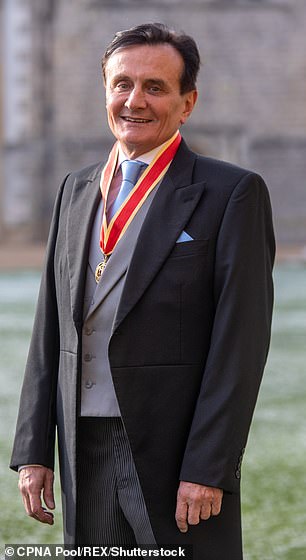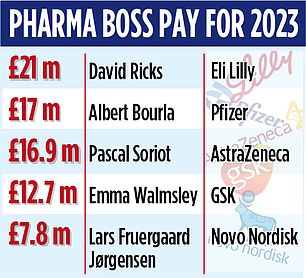- Drug giant asks shareholders to approve performance-based pay policy
- It could earn Pascal Soriot a reward of up to £18.7 million this year
- That would take his total earnings to £153m since he took over in 2012
<!–
<!–
<!– <!–
<!–
<!–
<!–

High earner: AstraZeneca boss Pascal Soriot
The CEO of AstraZeneca is set to become the FTSE 100’s first £150m boss.
The drugs giant is asking its shareholders to approve a performance-based pay policy that could earn Pascal Soriot rewards of up to £18.7 million this year.
That would take his total earnings since taking over in 2012 to £153 million. To date, the businessman has been paid more than £135 million.
Soriot, 64, has been widely praised for reviving the fortunes of one of Britain’s biggest pharmaceutical companies and providing millions with a life-saving Covid-19 vaccine.
He also fought off an unwanted takeover bid from US rival Pfizer. However, some investors are wary due to the size of his pay and bonus package.
The French-Australian CEO faces a battle for investor support for his huge profits.
Two influential shareholder advisory groups, Glass Lewis and ISS, are urging investors to vote against the compensation plan at this week’s annual meeting, calling it “excessive.” Under the proposal, Soriot (pictured) could earn a bonus worth up to 300 percent of his almost £1.5 million basic salary plus performance-related share awards worth up to 850 percent of basic salary. This is an increase from the previous pay agreement, which allowed for a 250 percent bonus and awards worth 650 percent of his base salary.
AstraZeneca has argued that the increase is “necessary to increase the company’s competitive position” compared to its rivals in the US and Europe.
Soriot has complained in the past about underpayment compared to other global pharmaceutical bosses.
But Glass Lewis says there is a ‘lack of compelling evidence’ that the AstraZeneca boss is underpaid.
Emma Walmsley, CEO of British rival GSK, was paid £12.7 million last year, compared to Soriot’s £16.9 million. Albert Bourla, head of Pfizer, took home £17 million.
Europe’s largest drug group, Danish firm Novo Nordisk, maker of weight-loss drug Ozempic, paid its boss Lars Fruergaard Jørgensen £7.8 million.
One of the top earners globally in the drugs sector is Eli Lilly boss David Ricks, who was paid £21m in 2023.


Leading business figures in the city, including Julia Hoggett, head of the London Stock Exchange Group, are pushing for executives to receive higher salaries. Hoggett called for a “constructive discussion” on executive pay and said Britain needed to attract top talent and discourage companies from moving abroad.
Soriot’s compensation has caused controversy among shareholders in the past. Nearly 40 percent of votes cast at AstraZeneca’s 2021 shareholder meeting were against the compensation plan, which is determined every three years.
Companies where more than 20 percent of shareholders vote against their bosses’ pay will be placed on a ‘list of shame’ drawn up by trade body The Investment Association.
“Given concerns previously raised about the extreme levels of executive pay at AstraZeneca, it is disappointing that the company has chosen to give its CEO an even higher pay package,” said Andrew Speke of the High Pay Center think tank.
He added that no CEO “deserves to be paid more than 500 times the average British worker.”
Investors in AstraZeneca may be willing to reward Soriot for his stellar track record at the drug giant.
He has had one of the most successful careers in the history of British business, leading the development of one of the first Covid-19 vaccines and repelling Pfizer’s hostile takeover bid in 2014.
Under his leadership, AstraZeneca’s market value has more than tripled to £164 billion, putting it ahead of HSBC and behind Shell on the London Stock Exchange.
Astra now has a market value higher than that of its former lover Pfizer, at £120 billion.

